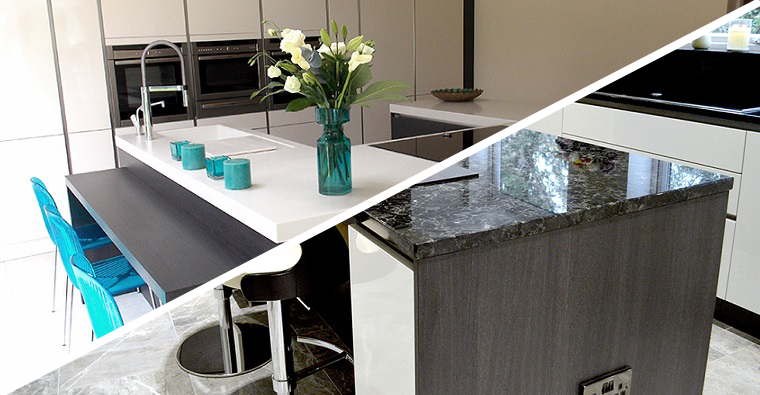
Corian® vs. granite: which is best for my project?
Posted by Whitehall on 13th JanWhen choosing a surface fabrication for your project, the choice often comes down to natural vs. solid.
Natural stone has long been used in kitchen design, creating a beautiful and luxurious finish for surfaces of all sizes. However, in recent years, synthetic solid surfaces have become prevalent as a cheaper and more versatile alternative.
So, is either the better option? And what specific properties are they chosen for?
Here we look at the pros and cons of two examples – granite natural stone and Corian® solid surface – to deduce their key differences:
Durability
| Granite | Corian® |
| ✓ Formed from surface lava millions of years ago, granite has been compacted underground and is incredibly strong and very durable. | ✓ Made from a unique blend of acrylics and natural minerals, Corian® is shaped using extremely high temperatures. This gives it immense strength and durability. |
Stain resistance
| Granite | Corian |
| ✕ Although resistant to most stains, granite is porous and so some substances, such as acidic food and drink or strong cleaning products, can stain and damage the surface if left too long. | ✓ Corian® is non-porous and therefore can’t be damaged by stains. This makes Corian® surfaces hardwearing and practical both within the home and commercially in hospitals and labs, for instance. |
Scratch resistance
| Granite | Corian |
| ✓ Because of its natural durability, granite is very difficult to scratch and is resistant to most scrapes caused by wear and tear. | ✕ Although Corian® is not completely scratch resistant, it is possible to easily remove scratches. |
Surface colour range
| Granite | Corian |
| ✓ Granite is naturally formed and is often millions of years old, making it an extremely desirable design feature. The natural colours and patterns in a granite surface give it unique character and it is this authenticity that gives granite its appeal. | ✓ Corian® is available in hundreds of colours and blends, making it an extremely versatile material. This flexibility means it can be incorporated into lots of different designs, however as a man-made product, the artificial nature of Corian® may be a deterrent. |
What’s the verdict?
- Corian® solid surfaces are a more versatile material and fit with a wider range of design schemes
- Being a synthetic material, Corian® is slightly more hygienic and hardwearing
- Granite has the advantage of being natural, giving it authentic appeal
- Although slightly more expensive, granite surfaces have a unique appearance that can’t be replicated
Still not sure which surface is right for your project? Ultimately, the decision comes down to balancing the priorities of your end client with your budget.
Why not let us help you decide? Contact our expert fabricators today.
Back to blog


